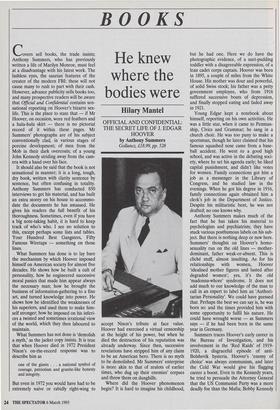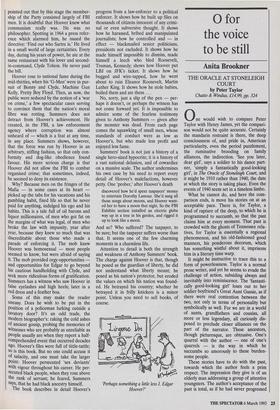BOOKS
He knew where the bodies were
Hilary Mantel
OFFICIAL AND CONFIDENTIAL: THE SECRET LIFE OF J. EDGAR HOOVER by Anthony Summers Gollancz, £18.99, pp. 528 Covers sell books, the trade insists; Anthony Summers, who has previously written a life of Marilyn Monroe, must feel at a disadvantage with his latest work. The lashless eyes, the saurian features of the creator of the modern FBI: these will not cause many to rush to part with their cash. However, advance publicity sells books too, and many prospective readers will be aware that Official and Confidential contains sen- sational reporting on Hoover's bizarre sex- life. This is the place to state that — if Mr Hoover, on occasion, wore red feathers and a hula-hula skirt — there is no pictorial record of it within these pages. Mr Sununers' photographs are of his subject conventionally clad, in various stages of porcine development; of men from the Mob in their dark overcoats; of a young John Kennedy striding away from the cam- era with a hand over his face.
It should also be said that the book is not sensational in manner; it is a long, tough, dry book, written with clarity sentence by sentence, but often confusing in totality. Anthony Summers has conducted 850 interviews to get his material, and has built an extra storey on his house to accommo- date the documents he has amassed. He gives his readers the full benefit of his thoroughness. Sometimes, even if you have a big note-taking habit, it is hard to keep track of who's who. I see no solution to this, except perhaps some lists and tables. Your Hundred Best Gangsters, Fifty Famous Wiretaps — something on those lines.
What Summers has done is to lay bare the mechanism by which Hoover imposed himself on American society for almost five decades. He shows how he built a cult of personality, how he engineered successive moral panics that made him appear always the necessary man; how he brought the business of information-gathering to a fine art, and turned knowledge into power. He shows how he identified the weaknesses of his superiors, and used them to make him- self stronger; how he imposed on his inferi- ors a twisted and sometimes irrational view of the world, which they then laboured to maintain.
What Summers has not done is 'demolish a myth,' as the jacket copy insists. It is true that when Hoover died in 1972 President Nixon's on-the-record response was to describe him as
one of the giants . . . a national symbol of courage, patriotism and granite-like honesty and integrity.
But even in 1972 you would have had to be extremely naive or rabidly right-wing to accept Nixon's tribute at face value. Hoover had exercised a virtual censorship at the height of his power, but when he died the destruction of his reputation was already underway. Since then, successive revelations have stripped him of any claim to be an American hero. There is no myth to be demolished. Mr Summers' enterprise is more akin to that of zealots of earlier times, who dug up their enemies' corpses and threw them on dunghills.
Where did the Hoover phenomenon begin? It is hard to imagine his childhood, but he had one. Here we do have the photographic evidence, of a suet-pudding toddler with a disagreeable expression, of a lean cadet corps captain. Hoover was born in 1895, a couple of miles from the White House. His mother was dour and powerful, of solid Swiss stock; his father was a petty government employee, who from 1916 suffered successive bouts of depression, and finally stopped eating and faded away in 1921.
Young Edgar kept a notebook about himself, reporting on his own activities. He was a little star, when it came to Penman- ship, Civics and Grammar; he sang in a church choir. He was too puny to make a sportsman, though he later claimed that his famous squashed nose came from a base- ball accident. He went .to a good high school, and was active in the debating soci- ety, where he set his agenda early; he liked capital punishment, and didn't like votes for women. Family connections got him a job as a messenger in the Library of Congress, and he studied law in the evenings. When he got his degree in 1916, family connections again obtained him a clerk's job in the Department of Justice. Despite his militaristic bent, he was not drafted; no one knows why.
Anthony Summers makes much of the fact that he has taken his material to psychologists and psychiatrists; they have stuck various posthumous labels on his sub- ject. But there is nothing deep or new here. Summers' thoughts on Hoover's homo- sexuality run on the old lines — mother- dominant, father weak-or-absent. This is cliché stuff, almost insulting. As for his relationships with women, Hoover 'idealised mother figures and lusted after degraded women'; yes, it's the old 'madonna-whore' syndrome. It does not add much to our knowledge of the man to call in an expert to label him an `Authori- tarian Personality'. We could have guessed that. Perhaps the best we can say is, he was born so: and the times provided him with some opportunity to fulfil his nature. He could have wrought worse — as Summers says — if he had been born in the same year in Germany.
Summers traces Hoover's early career in the Bureau of Investigation, and his involvement in the `Red Raids' of 1919- 1920, a disgraceful episode of anti- Bolshevik hysteria. Hoover's 'enemy of choice' was always communism, and later the Cold War would give his flagging career a boost. Even in the Kennedy years, he tried to persuade the Attorney General that the US Communist Party was a more deadly foe than the Mafia; Bobby Kennedy pointed out that by this stage the member- ship of the Party consisted largely of FBI men. It is doubtful that Hoover knew what communism really was. He was no philosopher. Spotting in 1964 a press refer- ence which alarmed him, he issued the directive: 'Find out who Sartre is.' He lived in a small world of large certainties. Every day, during his years of power, he ate at the same restaurant with his lover and second- in-command, Clyde Tolson. He never paid the bill.
Hoover rose to national fame during the mid-thirties, when his 'G-Men' were in pur- suit of Bonny and Clyde, Machine Gun Kelly, Pretty Boy Floyd. Then, as now, the public were seduced by the notion of a 'war on crime,' a few spectacular cases serving to convince them that the nation's moral fibre was rotting. Summers does not detract from Hoover's achievement. He created, in the FBI, a law enforcement agency where corruption was almost unheard of — which is a feat at any time, in any place. Summers shows, however, that the force was run by Hoover in an arbitrary, stifling fashion, so that only con- formity and dog-like obedience found favour. His more serious charge is that Hoover did not allow the FBI to combat organised crime; that sometimes, indeed, he seemed to deny its existence.
Why? Because men on the fringes of the Mafia — in some cases at its heart — picked up the tabs for his vacations and his gambling habit, fixed life so that he never paid for anything, indulged his ego and his habits. This is a tale full of oil barons and liquor millionaires, of men who got fat on the margins of what was legal, of men who broke the law with impunity, year after year, because they knew so much that was discreditable about those who made a parade of enforcing it. The mob knew Hoover was homosexual — most people seemed to know, but were afraid of saying it. The mob provided orgy-opportunities — and opportunities for Edgar to go beyond his cautious handholding with Clyde, and seek more ridiculous forms of gratification. Summers has a witness who saw Hoover in false eyelashes and high heels; later in a red dress and a feather boa.
Some of this may make the reader uneasy. Does he wish to be put in the Position of a policeman lurking outside a lavatory door? It's an odd trade, the modern biographer's: raking the cold ashes of ancient gossip, probing the memories of witnesses who are probably as unreliable as People usually are when they report a half- comprehended event that occurred decades ago. Hoover's files were full of tittle-tattle; SO is this book. But no one could accuse it of .salacity, and one must take the larger point: Hoover persecuted 'sex deviants' With vigour throughout his career. He per- secuted black people, when they rose above the rank of servant; he feared, Summers says, that he had black ancestry himself. The book describes in detail Hoover's progress from a law-enforcer to a political enforcer. It shows how he built up files on thousands of citizens innocent of any crimi- nal or even subversive thought. It shows how he harassed, bribed and manipulated journalists; how he controlled and — in effect — blackmailed senior politicians, presidents not excluded. It shows how he made himself impossible to dismiss, made himself a leech who bled Roosevelt, Truman, Kennedy; shows how Hoover put LBJ on JFK's ticket. It shows how he bugged and wire-tapped, how he went about to ruin Eleanor Roosevelt, Martin Luther King. It shows how he stole babies, boiled them and ate them . . .
No, sorry, just a slip of the pen — per- haps it doesn't, or perhaps the witness has not come forward yet. It is impossible to admire some of the fearless testimony given to Anthony Summers — given after the monster was dead. From each page comes the squawking of small men, whose standards of conduct were as low as Hoover's, but who made less profit and enjoyed less fame.
Summers' book is not just a history of a single hero-sized hypocrite; it is a history of a vast national delusion, and of cowardice on a massive scale. The author undermines his own case by his need to report every detail of Hoover's malefactions, however petty. One 'prober,' after Hoover's death discovered how he'd spent taxpayers' money to entertain Dorothy Lamour. She'd sung all those songs about moons, and Hoover want- ed her to have a moon that night. So the FBI Exhibits section installed an electric globe way up in a tree in his garden, and rigged it up to look like a moon.
And so? Who suffered? The taxpayer, to be sure; but the taxpayer suffers worse than that. It seems one of the few charming moments in a charmless life.
Attention to detail is both the strength and weakness of Anthony Summers' book. The charge against Hoover is that, though he posed as the guardian of liberty, he did not understand what liberty meant; he posed as his nation's protector, but eroded the values on which his nation was found- ed. He betrayed his country; whether he betrayed it in frilly knickers is a minor point. Unless you need to sell books, of course.
'Perhaps something a little less J. Edgar Hoover?'



















































 Previous page
Previous page